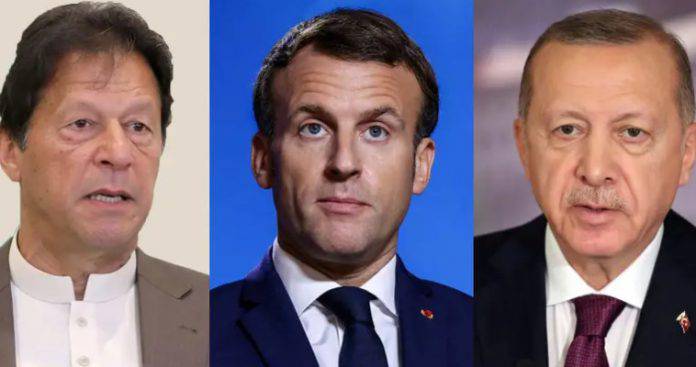Nefeli Lygerou: Who are those willing to join Erdogan’s Islamic Axis?
05/11/2020
Gathering Sunni Islamic countries around him, Erdogan seems to have declared holy war against the West, reserving for himself the role of leader. In particular, he is seeking to lead Sunni Islam, especially Turkic-speaking ethnicities and Muslim populations living in areas that previously belonged to the Ottoman Empire. After all, he scarcely hides his neo-Ottoman ambitions.
In this context, it is worth interpreting his statements that “Western countries attacking Islam want to start the Crusades again.” In his dispute with President Macron, he speaks as a de facto protector and representative of Muslims. Even the heinous attacks of Islamic terrorism have not diminished his bellicose rhetoric. It is indicative that he indirectly hints that he has the potential to provoke social uprisings of Muslim communities in Europe.
However, the latest terrorist attack targeting French citizens should normally have set the tone for Erdogan, but this did not happen, further straining Franco-Turkish relations. The Turkish president is even trying to turn the confrontation with him into a confrontation with Islam.
President Macron’s decision to project symbolic images with Charlie Hebdo sketches on public buildings was essentially a statement that freedom of expression in France is non-negotiable. At the same time, his government’s measures to control Islamic fundamentalism in French society are underway.
On the other hand, however, many Muslims see only the insult to their prophet, not the terrorism unleashed by their fellow believers. They are the ones who rush to side with Erdogan, adopting his narrative of “new crusades” in the West. This is not just about ordinary people, but also about regimes. Pakistan, Malaysia, Qatar, and Azerbaijan are lined up one way or another behind the Turkish president, with conservative Sunni Islam as a common denominator and a common geostrategic orientation.
Islamic terrorism
When Doha gave a breather to the collapsing Turkish economy with $ 15 billion, no one was surprised. The tiny but rich emirate has proven to be an steadfast friend to Erdogan. When in 2017 the United Arab Emirates and Saudi Arabia severed diplomatic ties with Qatar, creating conditions for its embargo, Turkey rushed to offer it a life preserver. It sent transport planes with food and other goods.
Mutual support is not just about geopolitical reasons. There is also an ideological common denominator. It is no coincidence that Turkey and Qatar support the Muslim Brotherhood and all its affiliates. The Sunni Muslim Brotherhood was founded in Egypt. The initial aim was to bring together the faithful Muslims in providing social work and charity, a practice followed by the Shiite organization Hezbollah in Lebanon.
The Brotherhood started as a religious and political-social movement with the aim of spreading from Egypt to the whole Arab world and beyond. In fact, it is the cradle from which not only Islamic fundamentalism but also Islamic terrorism emerged. There are the roots of both Al Qaeda and the Islamic State, even if their paths have diverged.
As mentioned above, Malaysia is also an ally of Erdogan’s Turkey. Especially the Islamic Party there, which has four ministers in the government. In late September 2019, Erdogan, Malaysian Prime Minister Mahathir Muhaid, and Pakistani Prime Minister Imran Khan met on the sidelines of the 74th United Nations General Assembly in New York. The three had then agreed to set up an English-language television channel to combat Islamophobia in the West.
Palestine and Lebanon
The Palestinian Hamas, which controls the Gaza Strip, is also a supporter of Erdogan. Erdogan is particularly popular in Palestine because of his rivalry with Israel. For years, he has been instrumentalizing the highly symbolic Palestinian issue in order to become a “protector” and leader of Muslims everywhere.
On the side of the Turkish president are also the Muslim Brotherhood of Lebanon, which had supported the popular uprising last October, which had no religious motives. It was launched on the occasion of the plan of the then Hariri government to tax the What’s up application. The Muslim Brotherhood is essentially trying to fill the gap in Sunni political representation due to the decline of secular ideologies and established parties in Lebanon. Their dynamism in this small country is a reflection of Turkey’s growing influence there.
It is no coincidence that the Turkish Foreign Minister hastened to visit Beirut after the deadly explosion, promising financial aid and Turkish citizenship to Lebanon’s Turkmen minority. There is, in fact, talk of arms smuggling by Turkey with Sunni organizations in Lebanon, through Syria. Last June, Sunni demonstrations took place in Lebanon against the Armenian minority. Protesters held Turkish flags and shouted slogans praising the Armenian genocide!
SADAT and ASSAM
In addition to governments, Erdogan is supported by organizations. The Center for Strategic Justice Research (ASSAM) is one of them. ASSAM is led by retired Brigadier General Adnan Tanriverdi, a former Erdogan chief military adviser. He resigned from his official position as a consultant in January 2020, but still maintains a close relationship with him.
Tanriverdi is also the owner of the paramilitary company SADAT, which many believe is Erdogan’s accomplice. SADAT played a key role in organizing the Turkish president’s supporters during the failed 2016 coup. ASSAM promotes the idea of an Islamic union led by the Turkish president.
Erdogan has also turned the various jihadist organizations that fought mainly in Syria against the Assad regime into puppets controlled by him. Many fighters that belonged to Al Qaeda and Islamic State, but have now become a kind of mercenaries in Ankara.
They are the ones who were transported by the Turks to Libya to fight against Haftar’s forces and were recently transferred again by the Turks to the Caucasus to fight on the side of the Azeris against the Armenians. In fact, Erdogan has set up an international network of jihadists, whom he uses as a tool of war to serve the goals of Turkish foreign policy.
Instrumentation of minorities
As part of his policy of exerting pressure, especially in Europe, the Turkish president is of course using the Turkish immigrant communities there as well. Having been weaving a network on a nationalist and religious basis for many years, he has managed to a large extent to control Turkish immigrants.
Now, he is trying to use them to influence mainly the Merkel government, since in Germany the Turks who have gained the right to vote are 3-4 million. To this end, Erdogan has close ties to the Islamists of the Milli-Gorus movement, which has about 350,000 members in Europe, mainly in Germany.
In recent years, Turkish penetration has been observed in countries that did not have traditional relations with Ankara. Through NGOs funded by the Erdogan regime, Turkey haErdos gained significant foothold in Muslim countries in Africa. An illustrative example is images of African Muslims cheering for the conversion of Hagia Sophia into a mosque and portraying Erdogan as the leader of the Muslim world. It is indicative that relevant events were organized in Somalia, Togo and other African countries.
In the Muslim world, several specifically Arab countries stand against Erdogan’s aspirations, with Egypt, Saudi Arabia and the United Arab Emirates first. The first reason is geopolitical. All three countries rightly believe that the Turkish president is using the Muslim Brotherhood to undermine the regimes there.
The second reason is the primacy traditionally held by Saudi Arabia in Islam, as the custodian of the holy sites, and the primacy also traditionally held by Egypt in the Arab world. President Abdel Fattah al-Sisi, who ousted President Morsi, a member of the Muslim Brotherhood, is aware that Erdogan is not just an opponent, but that he literally wants his head…





